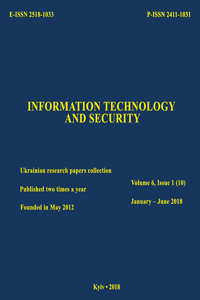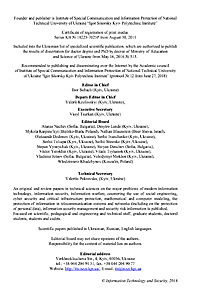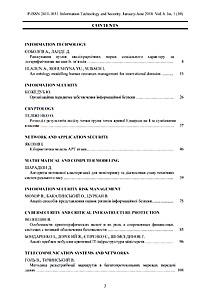


Артем Собол╓в, Дмитро Ланде
Ранжування вузл╕в кваз╕╕╓рарх╕чних мереж соц╕ального характеру за
логарифм╕чною вагою ╖х зв'язк╕в
// Information Technology and Security, 2018. - Vol. 6. Iss. 1 (10). - pp. 4-14.
DOI: https://doi.org/10.20535/2411-1031.2018.6.1.152899
|
Networks of social nature are the basis of all interactions between participants (usually people) that occur in the process of transferring information between them. Recently, the use of such networks is gaining in popularity. According to expert estimates in these networks, it is possible to get a lot of valuable information about their participants: from personal data (place of residence, contact number, e-mail address) to behavior and assessment of flavors. When evaluating a social networks, graphs representing the real interaction of nodes in such networks are represented. For evaluation, it is necessary to rotate the nodes, to conduct their detailed analysis, to evaluate the results obtained according to all the given criteria and to allocate among them the most influential. Existing algorithms for ranking in the overwhelming majority are estimated only by hierarchical networks, which does not allow to clearly determine the influence of nodes among themselves. The large number of links between nodes in social networks and their diverse distribution in most cases does not allow for the use of algorithms ranking the basic form, because the ignoring of minor, at first glance, linkages leads to false results. The paper analyzes the ranking of nodes and compares the results of the known algorithms for ranking the nodes HITS, PageRank with expert evaluation of the network. For the efficiency of the quasi-hierarchical networks research, the basic HITS algorithm was modified, which allows to analyze and rank nodes according to the given criteria (the number of input and output links among themselves). This is consistent with the results of expert evaluation. It is shown that due to the use of the modified algorithm results are obtained that correspond to real social connections between the subjects, and the indexes of the authorship of the nodes - to the previously provided social roles. The resulting algorithm allows you to evaluate and identify the most significant nodes in social networks and can be used in various industries where social networks are formed.
Keywords: Quasi-hierarchical networks of social nature, network subject, ranking algorithm, HITS algorithm, PageRank algorithm, nodes ranking, F-measure, expert evaluation, Zipf law |
[an error occurred while processing this directive][an error occurred while processing this directive] File not found. [an error occurred while processing this directive]
